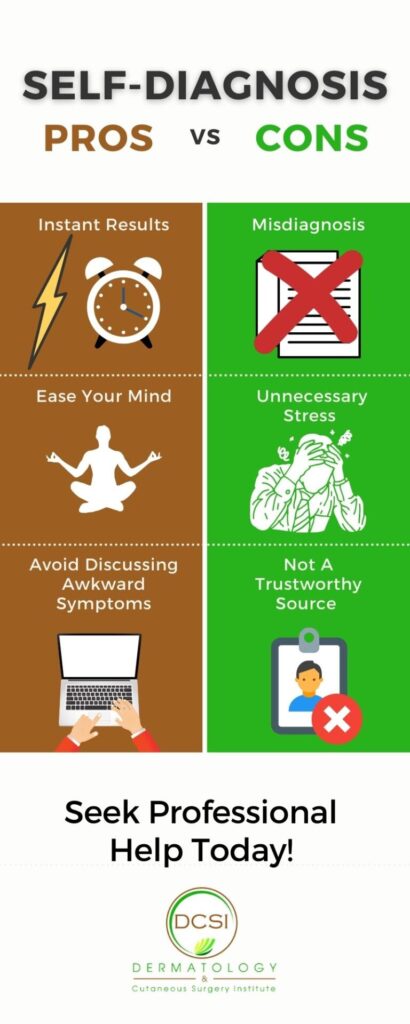Instagram, TikTok, Youtube and other social media platforms are acting as digital doctors. While living in the age of technology is truly beautiful, self-diagnosing can be harmful. On the other hand, receiving instant information for your troubling queries is one of the main reasons why people are leaning towards self-diagnosis. But how reliable is the information you are receiving?
Googling your symptoms could potentially be more dangerous than your true diagnosis. Thankfully, our dermatologist in Wellington is here to answer the burning question: is it bad to self-diagnose on the internet?
The Dangers of Online Self-Diagnosis
The first step after you find an unusual item on your body or experience symptoms that are out of the ordinary should be to contact your primary doctor or specialist, like a dermatologist. Unfortunately, though, it’s becoming more convenient and increasingly popular to self-diagnose via search results.
In the digital age, it makes sense why more and more people are turning to the internet as soon as they feel discomfort. Humans seek immediate answers. We also trust the opinions of multiple experts.
Googling your symptoms and receiving a direct response makes self-diagnosing that much more dangerous. How reliable are these sources? Is my condition more serious than Google is playing it out to be? These are a few of the dangers of online self-diagnosis.
Pros of Self-Diagnosis
Searching for your symptoms online does not have to be catastrophic. While there are many negatives to googling your symptoms, there are some pros to self-diagnosis. Receiving quick information and fast answers to your questions are great, but only when used correctly.
The internet can be helpful in the sense of pinpointing problems. Headaches, burns, bites, and other less serious problems can be resolved with help from the internet. But the internet cannot provide you with an accurate diagnosis. That is why you must seek guidance from professionals to be properly treated, especially if your concerns persist.
Cons of Self-Diagnosis
Consulting Google versus visiting a doctor is full of disadvantages. Doctors have years of medical experience to help diagnose and treat your problems. While receiving instant answers from search results may sound like a dream, it can be tough to verify the sourced information. Anyone and everyone can add their opinions and “expertise” on the internet, but what are their credentials?
It’s very common to receive bad advice on social media sites; TikTok has become the latest popular source for self-diagnosis. Users are seeking advice and diagnoses from medical professionals via the popular app. Thankfully, there are some doctors on TikTok who are encouraging users to visit a doctor in person to receive the proper testing necessary to diagnose and treat.
The problem with seeking advice online is that you could be getting completely wrong information from very unqualified individuals. While the information online could be accurate, it might not be specific enough to help with your self-diagnosis.
Aside from creating unwanted anxiety, misinformation online can lead to patients and doctors spending unnecessary amounts of time and money on testing. When googling your symptoms, your mind instantly assumes the worst possible scenario when, in reality, visiting your local doctor is much more appropriate than an incorrect self-diagnosis.
Seek Professional Help Today
Make sure you are careful about what you see online; 9 times out of ten, the internet is leading you to believe something completely inaccurate. A simple cough or the new freckle that just popped up out of nowhere could be much more serious than the information online. Instead of self-diagnosing online, it might be time to visit your dermatologist, primary doctor or specialist. Contact us today to find a proper treatment path and diagnosis for your problems. Keep in mind the dangers of online self-diagnosis the next time you feel or see something out of the ordinary.
Related Reading
- Common Florida Skin Conditions and Treatments
- The Importance of Skin Care: It’s Time to Take Care of Your Skin
Infographic added to the page on August 2021.


